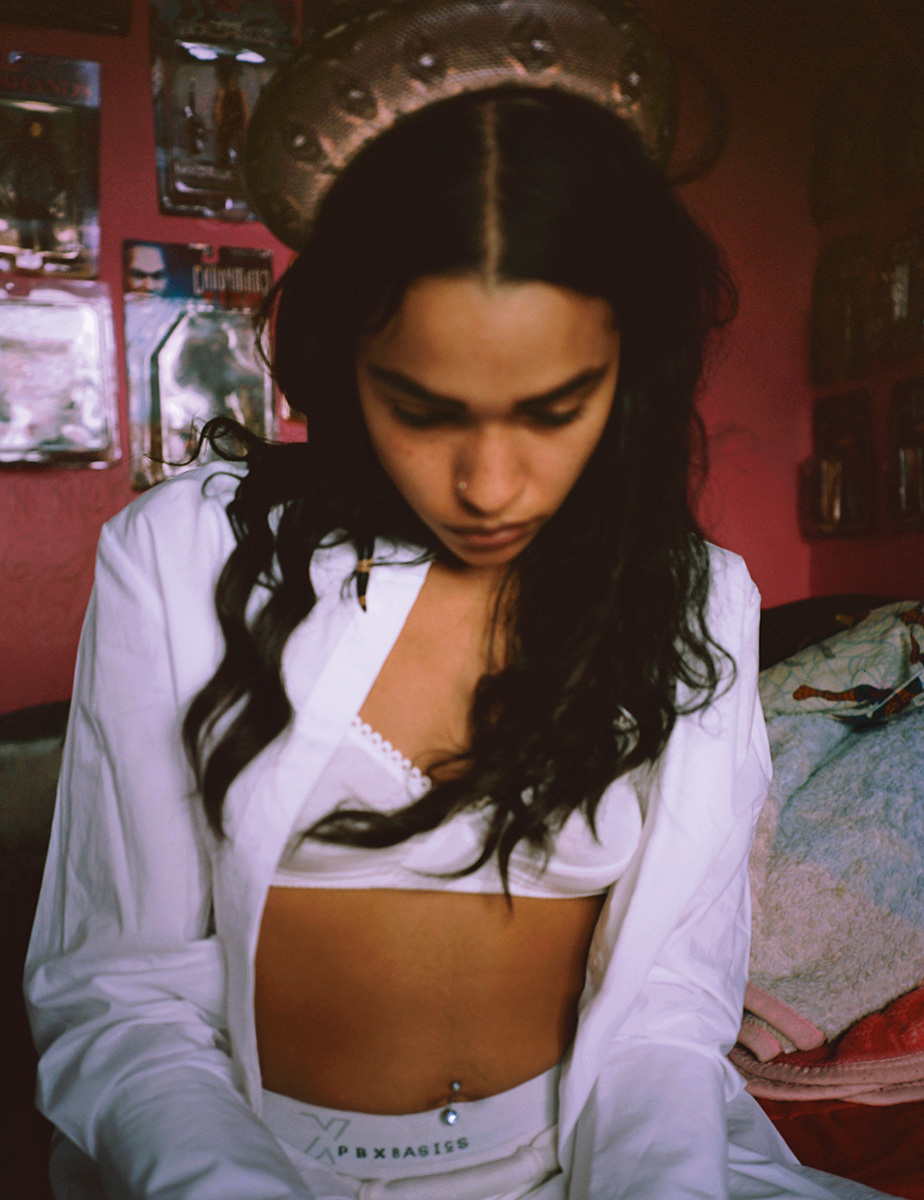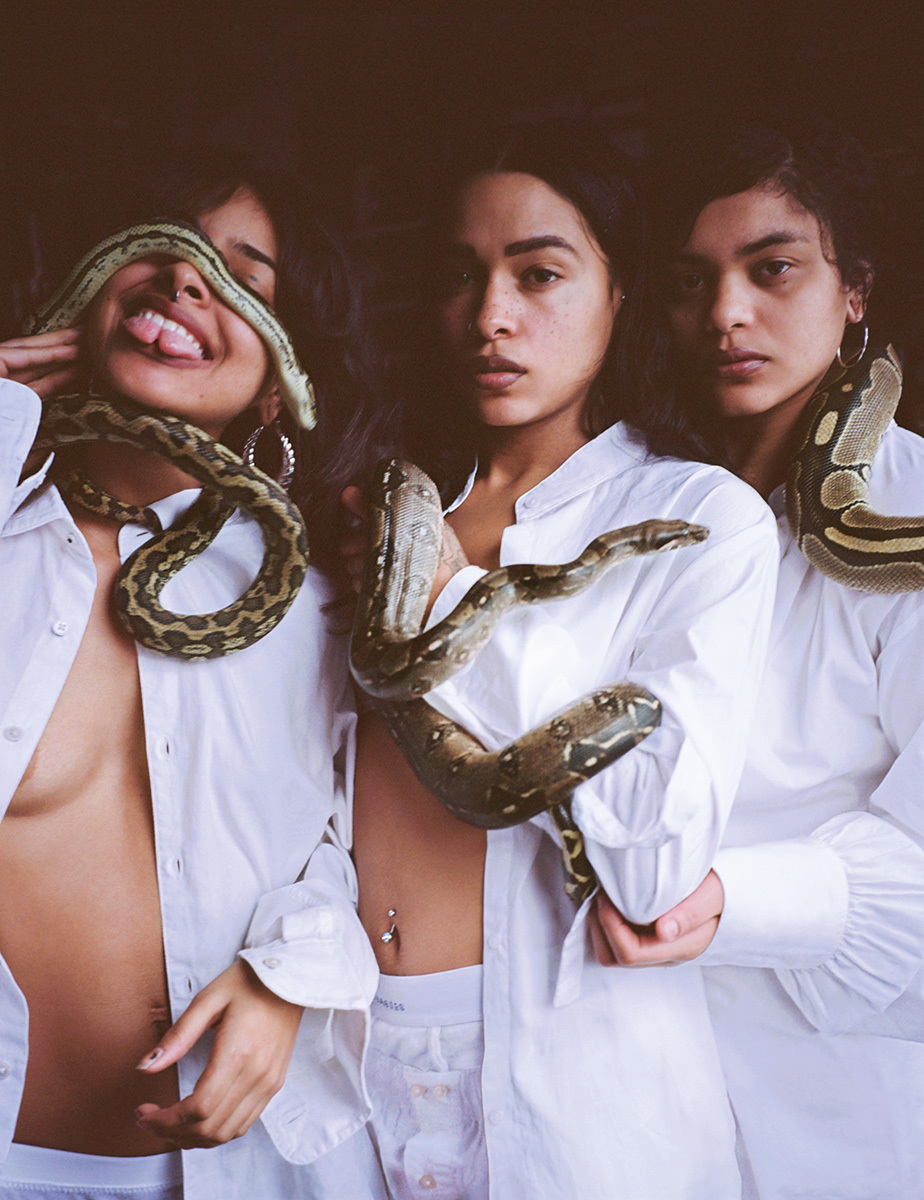Gia wears shirt Tome. Briefs GAP. Destiny wears shirt ManGo. Bra Araks. Boxer shorts Gap. Briefs model’s own. Rafa wears shirt DKNY.
When we meet Destiny Frasqueri — better known by her regal rap moniker Princess Nokia — in her native New York City, she’s with two of the women she’s closest to. One of them is Rafa, who, Destiny says, “is an amazing community organizer whose work has revolved around urban planning, feminism, and deconstructing gentrification.” These days, Rafa helps the hardcore scene thrive by organizing punk concerts in the Bronx for teenage youth. The other, Gia, “has been an animal rights and social justice activist for years.” She’s also a professional body suspender, who practices the intricate process for art installations and public entertainment.
We’re at Gia’s house in the Bronx, and because she specializes in snake medicine, she’s got five reptiles on hand. “When we’re hanging at Gia’s, just kicking it in her room, watching movies and playing with the kids, talking shit with each other, we always have snakes,” Destiny explains. “They have so many beautiful, holistic qualities that allow us to be peaceful among each other. They keep us calm and meditative.” Though the strength, sharp-wittedness, and power that’s so evident in Destiny’s music is discernible in her voice, so is the compassion, empathy, and wisdom she imparts in her lyrics. “I hold them down, they hold me down. Together, we’re warriors. We have each other’s back all the time, we look out for each other, we love each other unconditionally,” Destiny says of her tribe. “That’s a really rare thing in the world.”
Destiny has better words than “friend” to describe Rafa and Gia. One of them is “comai.” In Spanish, it means “your sister, the person who takes care of your children,” she explains. “I’m the godmother to their children, so I’m their comai. When I have children, they’ll be the godmothers, because they’re my comai.” Another word is “hoodrat,” which she characterizes as “an amalgamation of having punk rock, gothic, hardcore identities, as well as being from the ghetto. That’s just our shit. We don’t fit in anywhere because we personify equilibrium.”
Nowhere is that more apparent than in Destiny’s most recent record, 1992. The EP continues her dynamic evolution as an artist unafraid to fully explore and embrace all facets of her identity. Her genre-hopping debut full-length, 2014’s Metallic Butterfly, was followed up by the Donna Summer-esque Honeysuckle, a disco-tinged project released under her own name. September’s 1992 is a richly nuanced ode to 90s New York hip-hop, which Destiny was raised on while living between Harlem, the Lower East Side, and the Bronx. Standout track “Green Line” is anchored by the horn-heavy, introspective jazz production and bustling street recordings common to Nas’s worshiped early work. “Brujas” is slippery underground electronica upon which she lays intoxicating tribute to her Afro-Indigenous roots. “Bart Simpson” — 1992‘s big, bold opening beat — was made for Manhattan skating. In Destiny’s hands, this city’s heavyweight history is the foundation on which to build something thrillingly new.

“New York is a living, breathing vessel of poetry, art, fashion, pain, tragedy, uniqueness, color, diversity, weirdness, poverty. Everything is fascinating for me,” Destiny says. “It’s off-kilter, and I think that’s why it resonates with me. It’s in the poetry, it’s in the kineticism, it’s in the theater.” And it’s not just in the music. Part of what bonds Destiny to Rafa and Gia is their connection to their community — the shared experience of life in the city. “We hold shit down where we live, and we love where we live. We wouldn’t want to live anywhere else but New York. That’s what does it for us, being among our people, being among the community. That’s where we found ourselves, and that’s our uniqueness.”
Destiny understands the value of affirming communities far beyond her neighborhood, her borough, her city. She’s deeply committed to creating safe spaces at her live shows, and builds them through positivity and respect. In a recent documentary chronicling 1992‘s release party, Destiny both invokes Bikini Kill frontwoman Kathleen Hanna’s “girls to the front” rallying cry, and starts a Soul Train line. I ask why this is so important to her. “I know what it is to feel extremely neglected in a space. I know what it is to feel angered by neglect in a space. And I know what it is to feel unsafe in a space,” she explains. “As young women of color, it’s important that our voices, our opinions, our values, our narratives be understood, be included, be heard, be respected, be honored.”
Outside of her show venues, Destiny is building community through communication. Her chief vehicle is Smart Girl Club, a collective that’s hosted workshops and radio shows, and staged poetry performances. Its aims are rooted in building creative collaborations between women of all shapes, colors, and sexualities through art and community outreach. To Destiny, Smart Girl Club is “a safe space for me to decompress and turn my anger and my dissatisfaction into positive outlets. And I think that’s why safe spaces are always important; it’s one thing to feel the anger, but it’s always about finding a healthy solution for it.”
Smart Girl Club is rooted in the perspective and experiences of urban feminism, “a tangible form of feminism that is accessible to inner city women who do not have access to the institutionalized forms of feminism” represented in higher education. “It’s for women like myself, who identify on such a multitude of planes and need something that is relatable. Urban feminism is in the community I grew up in, we’re not invisible,” she says. “It’s saying that whether you like it or not, we’re gonna be represented, we’re gonna demand respect, we’re gonna counteract negligence with our presence, we’re gonna create tools of awareness and protection for sisterhood, for education, and for better ways to navigate our lives. It’s our goal.” All hail Princess Nokia. Long may she reign.
Credits
Text Emily Manning
Photography Zachary Chick
Styling Katelyn Gray
Styling assistance Marie Choi
